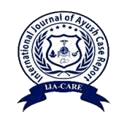Managing Symptoms of Substance Use Disorder with Nasya and Ayurvedic Medicines: A Case Study
Abstract
A substance use disorder (SUD), also known as a drug use disorder, is a condition in which the use of one or more substances leads to a clinically significant impairment or distress. Dependence and Addiction are components of a substance use disorder and addiction represents the most severe form of the disorder. A 21-year-old male patient visited the OPD of department of Panchkarma, Rishikul Campus, Uttarakhand Ayurved University, Haridwar with the complaints of craving for Substances (cigarette, weed, alcohol), suicidal tendency, irritability, pain and numbness in bilateral lower limbs and hopelessness for about 1 month. According to the patient, all these symptoms appeared after withdrawal of Substances (Cigarette & Bidi). He was diagnosed under the category of Nicotine Based Substance Use Disorder after screening. Ayurveda considers Substance Use Disorder under the topic of Dushi Visha (cumulative poisons), which means a type of toxin which remains inside the body for long and then produces various ill effects on body. He was given Nasya with Brahmi Ghrita and Personified Ayurvedic Formulation (self-made formulation, made up of powders of Medhya Dravyas) in the dose of 3 gms twice a day before meals for a period of 12 weeks. Follow-up was done during and after treatment. Improvement was seen in all the symptoms. Hence, it can be concluded that Comprehensive Ayurvedic Management is effective in this emerging challenging disease of Substance Use Disorder.

This work is licensed under a Creative Commons Attribution-NonCommercial-NoDerivatives 4.0 International License.

